|
|
|
Sort Order |
|
|
|
Items / Page
|
|
|
|
|
|
|
| Srl | Item |
| 1 |
ID:
078455
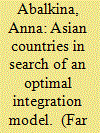

|
|
|
| 2 |
ID:
089128
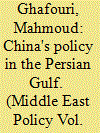

|
|
|
|
|
| Publication |
2009.
|
| Summary/Abstract |
Since 1996, China has become a net importer of crude oil, currently the second-largest consumer in the world after the United States and the third-largest importer of oil after the United States and Japan.
|
|
|
|
|
|
|
|
|
|
|
|
|
|
|
|
| 3 |
ID:
167805
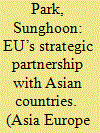

|
|
|
|
|
| Summary/Abstract |
The European Union has struggled for a long time to increase the international profile of its foreign policy. The intensity of the EU’s foreign policy has been a function of the speed and efficacy of its own internal integration programs. For instance, the Single European Market (SEM) program pursued during the period of 1986–1992 took a substantial amount of time and resources of the EU policy makers, thereby leading to a temporary vacuum of EU’s foreign policy especially vis-à-vis countries geopolitically remote to the EU, including the Asian region. The adoption in 1994 of the New Asia Strategy (NAS) was a welcomed move by the EU to reinvigorate its relationship with Asian countries that had been showing an increasing strategic value since the mid-1980s. The USA also adopted an aggressive Asia Strategy under the name of Big Emerging Markets (BEMs) strategy around the same time, through which the US administration designated 17 big emerging markets as priority economic (and political) cooperation partners. In fact, 12 of 17 BEMs were Asian countries, which signaled that Asia was rediscovered and the USA and the EU started competing for a strategic leverage in the Asian region.
|
|
|
|
|
|
|
|
|
|
|
|
|
|
|
|
| 4 |
ID:
104237


|
|
|
|
|
| Publication |
2011.
|
| Summary/Abstract |
This article explores critically the assumption that the burden of disease remains heavier for women than for men. The impact of gender on health is better understood when the burden of disease is analysed in terms of its two dimensions, the domestic and the public. This dual approach reveals that, concerning the public burden of disease, morbidity and mortality trends are becoming similar for men and women while, with the domestic burden of disease, gender shows that differences seem to persist in men and women's roles within the family, particularly involving illness prevention and management at home. This argument is explored in this paper through two types of evidence: to investigate the domestic burden of disease, reference is made to findings from studies on gender roles in the family; and the public burden of disease is explored using the World Health Organization's latest figures on mortality and morbidity. The domestic and public dimensions of the burden of disease are discussed in the context of ten Asian countries at different stages of socio-economic development (Japan, Singapore, South Korea, Malaysia, Thailand, China, Indonesia, Philippines, Vietnam and Cambodia).
|
|
|
|
|
|
|
|
|
|
|
|
|
|
|
|
| 5 |
ID:
116366
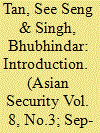

|
|
|
|
|
| Publication |
2012.
|
| Summary/Abstract |
Defense diplomacy is a relatively new phenomenon aimed at addressing the strategic complexity and uncertainty of the post-Cold War world. It has hitherto received little analytical attention where defense relations in Southeast Asia are concerned. Our article seeks to redress that lack. Borrowing from historical and contemporary debates on diplomacy, we offer a working definition of defense diplomacy that distinguishes its pragmatic and transformative aspects. Building on the four articles that follow, we suggest that bilateral and multilateral engagements in defense diplomacy by Asian countries have primarily been pragmatic in form and function, aimed at maintaining peaceful and stable regional relations. Our modest contribution is hopefully a useful start to what could in time become a meaningful debate and cumulative knowledge on defense diplomacy.
|
|
|
|
|
|
|
|
|
|
|
|
|
|
|
|
| 6 |
ID:
088668
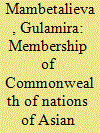

|
|
|
| 7 |
ID:
132647
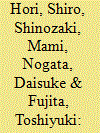

|
|
|
|
|
| Publication |
2014.
|
| Summary/Abstract |
In Asian developing countries, energy saving has become a crucial issue in sustainable development. However, in countries that possess weak government regulations and market mechanisms, industries are expected to save energy voluntarily. Therefore, corporate social responsibility (CSR) can serve as an important incentive to encourage companies to take voluntary actions.
In this paper, we analyze CSR recognition and energy-saving actions taken by companies located in two Asian cities. The results of a questionnaire survey revealed that a positive relation exists between CSR recognition and energy saving. In developing countries, CSR develops based on concerns expressed by local cultures and communities. This indicates that the positive relationships that exist between CSR and energy-saving actions reflect the social norms of these communities. The results suggest that policies that encourage companies to enhance their CSR activities in society can serve as effective incentives to encourage energy-saving actions.
|
|
|
|
|
|
|
|
|
|
|
|
|
|
|
|
| 8 |
ID:
162508
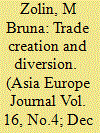

|
|
|
|
|
| Summary/Abstract |
Based on estimation of the gravity equation, this article aims to scrutinise the trade effects emanating from the economic integration of the European Union (EU) by focusing on the trade diversion and trade creation effects of the fifth EU enlargement on 12 groups of agricultural and food products. This paper analyses the changes due to the EU’s enlargement of trade patterns in the agricultural and food sectors among the EU member states and between EU and non-EU countries as well as the effects of the enlargement on exports of agricultural and food products from selected Asian countries to the EU market. Our analysis shows no decline in exports from EU to non-EU countries. Trade creation effects are significantly high for 4 product groups: seafood, woody plants, beverages and tobacco, and animal and vegetable materials. However, trade diversion effects are found in animal and vegetable oils and textile fibres. Moreover, the economic integration has had no significant effect on exports from Asian countries, namely agricultural and food products. The data of 38 countries cover the period 1999–2015.
|
|
|
|
|
|
|
|
|
|
|
|
|
|
|
|
|
|
|
|
|